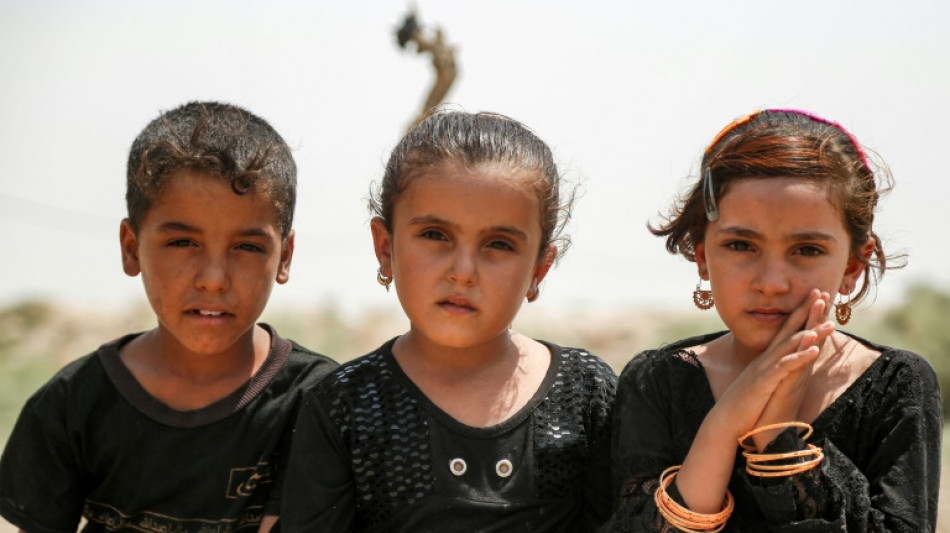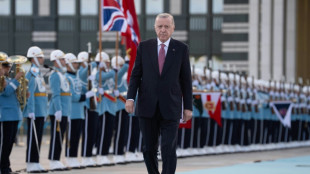
-
 Haaland's Norway thump sorry Italy to reach first World Cup since 1998
Haaland's Norway thump sorry Italy to reach first World Cup since 1998
-
Portugal, Norway book spots at 2026 World Cup

-
 Sinner hails 'amazing' ATP Finals triumph over Alcaraz
Sinner hails 'amazing' ATP Finals triumph over Alcaraz
-
UK govt defends plan to limit refugee status

-
 Haaland's Norway thump Italy to qualify for first World Cup since 1998
Haaland's Norway thump Italy to qualify for first World Cup since 1998
-
Sweden's Grant captures LPGA Annika title

-
 Tuchel lays down law to Bellingham after England star's frustration
Tuchel lays down law to Bellingham after England star's frustration
-
Sinner caps eventful year with ATP Finals triumph over great rival Alcaraz

-
 Portugal book spot at 2026 World Cup as England stay perfect
Portugal book spot at 2026 World Cup as England stay perfect
-
Hakimi, Osimhen, Salah shortlisted for top African award

-
 Sinner beats great rival Alcaraz to retain ATP Finals title
Sinner beats great rival Alcaraz to retain ATP Finals title
-
Schenk wins windy Bermuda Championship for first PGA title

-
 Crime, immigration dominate as Chile votes for president
Crime, immigration dominate as Chile votes for president
-
Kane double gives England record-setting finish on road to World Cup

-
 World champions South Africa add Mbonambi, Mchunu to squad
World champions South Africa add Mbonambi, Mchunu to squad
-
Greenpeace says French uranium being sent to Russia

-
 'Now You See Me' sequel steals N. American box office win
'Now You See Me' sequel steals N. American box office win
-
Argentina beat Scotland after frenzied fightback

-
 Argentina beat Scotland after stunning fightback
Argentina beat Scotland after stunning fightback
-
Pope urges leaders not to leave poor behind

-
 Pressure will boost Germany in 'knockout' Slovakia clash, says Nagelsmann
Pressure will boost Germany in 'knockout' Slovakia clash, says Nagelsmann
-
Ecuador votes on hosting foreign bases as Noboa eyes more powers

-
 Portugal qualify for 2026 World Cup by thrashing Armenia
Portugal qualify for 2026 World Cup by thrashing Armenia
-
Greece to supply winter gas to war battered Ukraine

-
 India and Pakistan blind women show spirit of cricket with handshakes
India and Pakistan blind women show spirit of cricket with handshakes
-
Ukraine signs deal with Greece for winter deliveries of US gas

-
 George glad England backed-up haka response with New Zealand win
George glad England backed-up haka response with New Zealand win
-
McIlroy loses playoff but clinches seventh Race to Dubai title

-
 Ecuador votes on reforms as Noboa eyes anti-crime ramp-up
Ecuador votes on reforms as Noboa eyes anti-crime ramp-up
-
Chileans vote in elections dominated by crime, immigration

-
 Turkey seeks to host next COP as co-presidency plans falter
Turkey seeks to host next COP as co-presidency plans falter
-
Bezzecchi claims Valencia MotoGP victory in season-ender

-
 Wasim leads as Pakistan dismiss Sri Lanka for 211 in third ODI
Wasim leads as Pakistan dismiss Sri Lanka for 211 in third ODI
-
Serbia avoiding 'confiscation' of Russian shares in oil firm NIS

-
 Coach Gambhir questions 'technique and temperament' of Indian batters
Coach Gambhir questions 'technique and temperament' of Indian batters
-
Braathen wins Levi slalom for first Brazilian World Cup victory

-
 Rory McIlroy wins seventh Race to Dubai title
Rory McIlroy wins seventh Race to Dubai title
-
Samsung plans $310 bn investment to power AI expansion

-
 Harmer stars as South Africa stun India in low-scoring Test
Harmer stars as South Africa stun India in low-scoring Test
-
Mitchell ton steers New Zealand to seven-run win in first Windies ODI

-
 Harmer stars as South Africa bowl out India for 93 to win Test
Harmer stars as South Africa bowl out India for 93 to win Test
-
China authorities approve arrest of ex-abbot of Shaolin Temple

-
 Clashes erupt in Mexico City anti-crime protests, injuring 120
Clashes erupt in Mexico City anti-crime protests, injuring 120
-
India, without Gill, 10-2 at lunch chasing 124 to beat S.Africa

-
 Bavuma fifty makes India chase 124 in first Test
Bavuma fifty makes India chase 124 in first Test
-
Mitchell ton lifts New Zealand to 269-7 in first Windies ODI

-
 Ex-abbot of China's Shaolin Temple arrested for embezzlement
Ex-abbot of China's Shaolin Temple arrested for embezzlement
-
Doncic scores 41 to propel Lakers to NBA win over Bucks

-
 Colombia beats New Zealand 2-1 in friendly clash
Colombia beats New Zealand 2-1 in friendly clash
-
France's Aymoz wins Skate America men's gold as Tomono falters


Climate change and filthy water drive disease in Iraq
A worried Iraqi father points at a blister on the face of his one-year-old daughter, the result of a parasitic infection carried by sandflies in her remote village.
"It's a skin disease, the 'Baghdad boil'," Najeh Farhan said of the pustule on Tiba's mouth as the toddler played with a pacifier at their home in the drought-hit province of Al-Diwaniyah.
Like countless other children in Iraq -- a country battling the effects of war, entrenched poverty, water stress and a heating planet -- Tiba is sick but has no access to good health care.
"There is no medical centre, we have nothing," Farhan, a father of seven, said of his small village of Al-Zuweiya.
Tiba has been infected with an illness called cutaneous leishmaniasis, endemic in Iraq for decades.
By 2022, the World Health Organization said 8,000 infections had been registered in the country.
But this year, in a "surprising development", it reported the first confirmed case in what had been a "traditionally sand fly-free" province in northern Iraq.
The UN agency has pointed to "inadequate access to medical treatment in remote areas" as a driver of the disease -- but a senior WHO official also highlighted the effects of climate change.
"The sandfly, like any other insect, thrives at a specific temperature and humidity level," Wael Hatahit, the WHO's acting representative in Iraq, told AFP.
He pointed to Iraq's "temperature rise and the change in the water fall pattern" and said the northward spread of the disease the sandfly carries "cannot be explained unless there is climate change".
- 'Rising temperatures' -
Tiba and one of her brothers, who suffers from jaundice and a skin rash, are victims of Iraq's broader public health crisis.
From cholera to chronic diarrhoea and sandstorm-triggered asthma attacks, the list of health problems confronting disadvantaged communities is long.
The Iraqi Red Crescent has been running a campaign in nine provinces across the country's south and centre where soaring heat and drought have badly hit farming communities.
It has sent 25 doctors, 150 volunteers, five mobile clinics and 10 ambulances on a campaign to provide free medical care and raise awareness on a range of health threats.
On a recent stop, women dressed in black were waiting alongside ambulances to have a child examined, in Al-Ayyach, another Diwaniyah village, as aid workers sorted through their medical supplies.
Raghda Ihsane, a pharmacist, listed the most common cases the team was treating: "Intestinal infections, dermatological diseases, skin rashes resulting from poor water quality, inflamed urinary tracts."
Dirty and unsafe water is a prime health threat in Iraq, one of the five countries worst hit by climate change impacts and now gripped by its fourth consecutive year of drought.
The scarcity is compounded by reduced Tigris and Euphrates river flows because of upstream dams, and damage done by conflict and neglect to treatment plans and water infrastructure.
- 'Contaminated water' -
An environment ministry official recently admitted that "sewer pipes in Baghdad discharge wastewater directly into the Tigris River", in comments quoted by the state-run Al-Sabbah daily.
Cholera is raging in the north, particularly in Sulaimaniyah, Iraqi Kurdistan's second city, where the WHO had registered 152 confirmed cases by September 12.
"The principal cause is the use of non-potable water," said Sabah Hourami, director of Sulaimaniyah's health authority.
Officials were taking action, he insisted, by testing the chlorine content of public water supplies and tightening controls on water tankers, restaurants and mosques.
As patients have flocked to local hospitals, he said, "we no longer screen people. Those suffering from diarrhoea and vomiting are automatically treated as cholera cases."
Water stress is at the core of the health threats, said medical anthropologist Mac Skelton, who heads the Institute of Regional and International Studies at the American University of Iraq-Sulaimani.
"Decreased water flow means higher concentrations of sewage and industrial pollutants in the water supply, which Iraq's water treatment facilities typically cannot process adequately," he said.
This, he said, was "associated with a range of conditions such as cholera, gastrointestinal diseases, skin diseases and diarrhoea".
Looking ahead, Skelton said, Iraq needs "improved public health systems to warn the populace of heightened contamination and to monitor outbreaks".
He added that "enhancing Iraq's seriously deteriorated water treatment infrastructure is also essential".
M.Qasim--SF-PST




